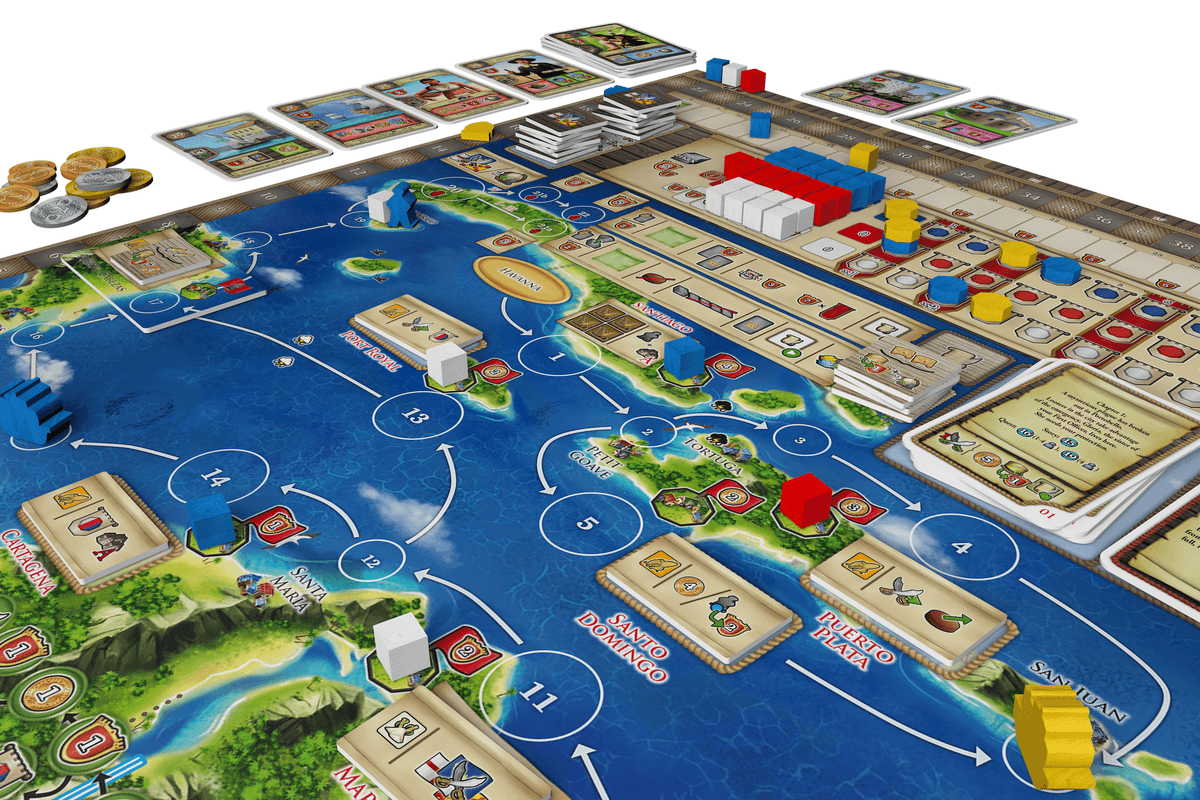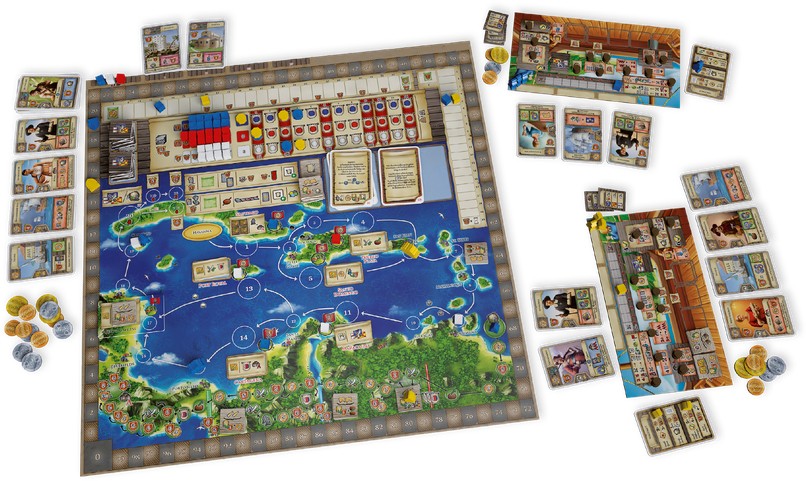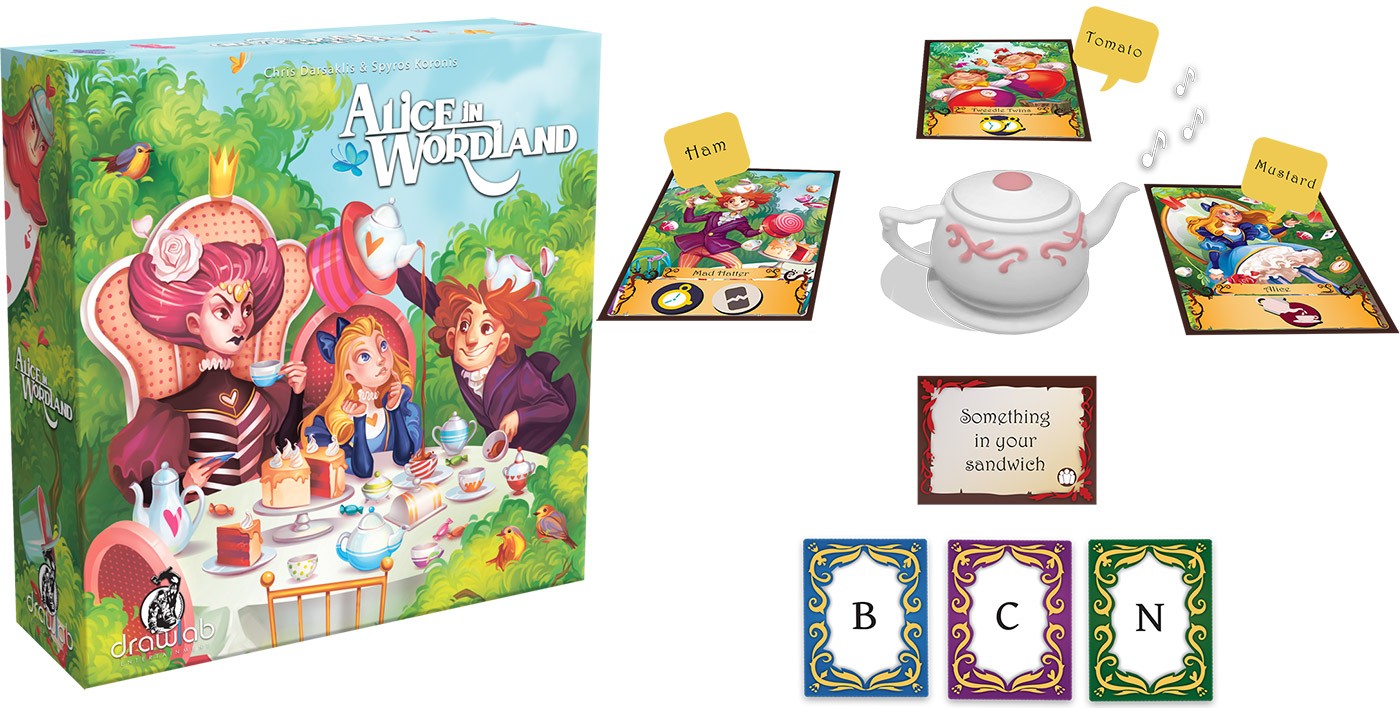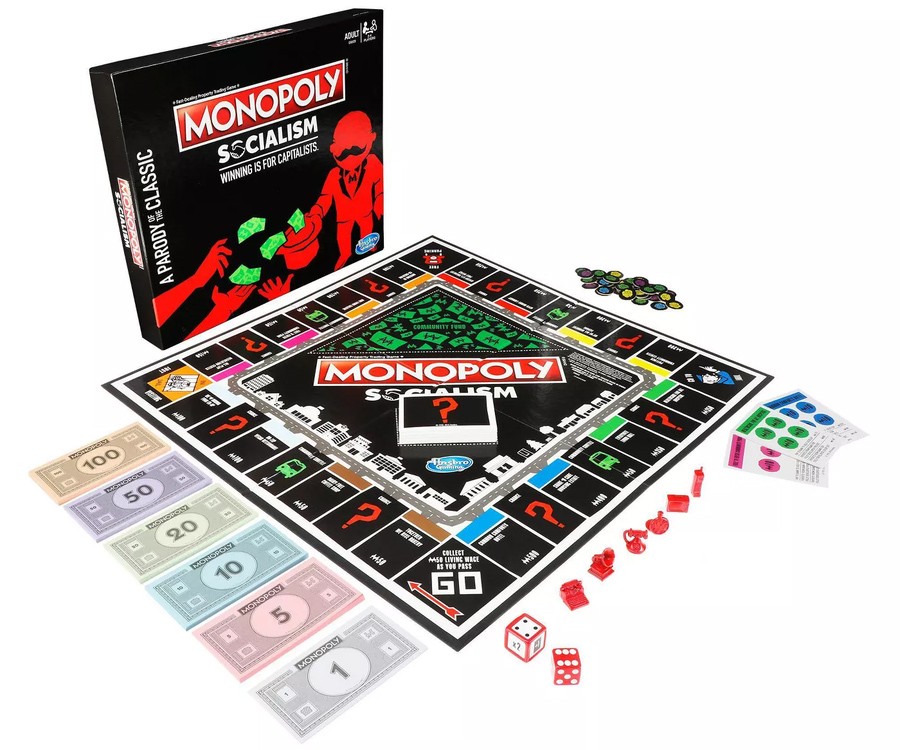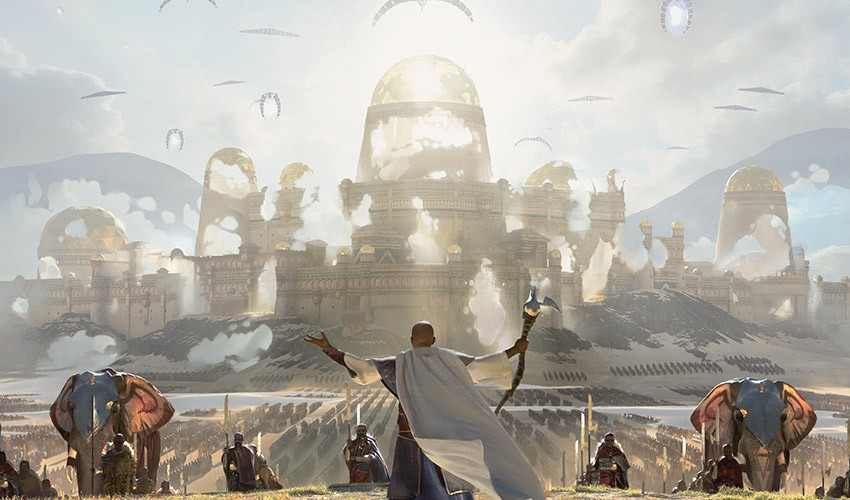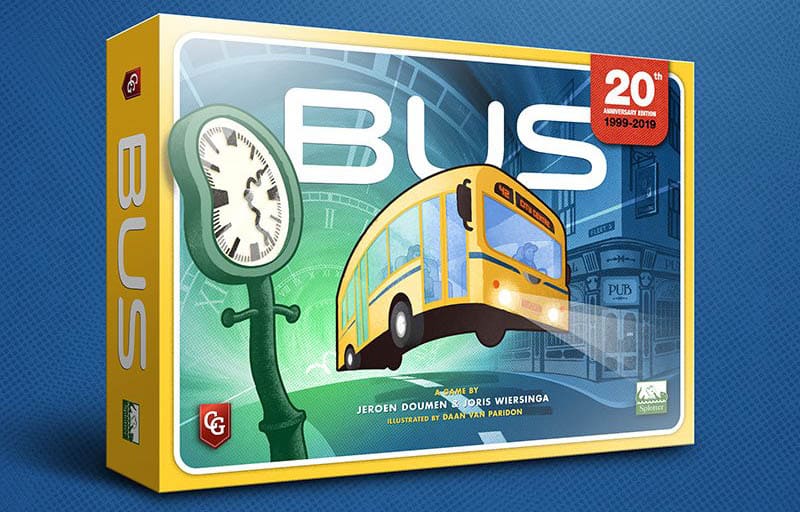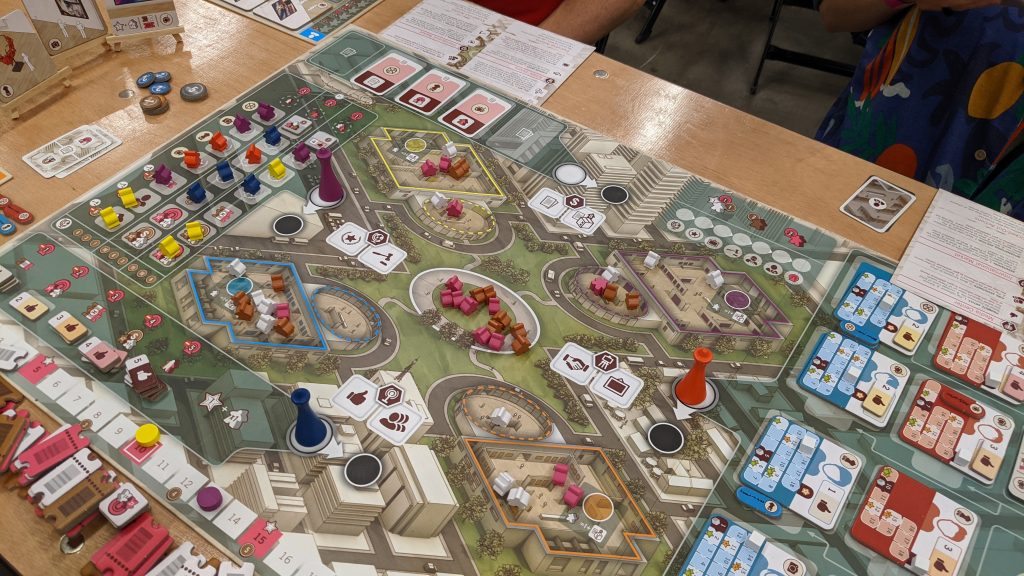Quinns: Ava, you must dampen the news and lift it to my forehead. Brighton is experiencing the last big, thick heatwave of the summer. I don’t know if I’ll survive.
Ava: It’s not just Brighton! It’s a bank holiday, so air all across the United Kingdom has turned into a thick, hot porridge, and I’m so glad we get to slip into a nice cool bath of news together.
Quinns: Ah, I forgot. Not only do the banks get a day off, so does air.
Not news, though! The news never stops, and we never stop never stopping it. Onwards!
Quinns: Alexander Pfister, the man behind Shut Up & Sit Down favourites Isle of Skye and Great Western Trail, has announced his latest big ol’ strategy game! Maracaibo will see players sailing in a circle around the sun-drenched Carribean, stopping only at ports to use their specific action. In other words, it’s the same foundation as Great Western Trail, making this game Great Wet Trail.
…That’s probably the last time I’ll be using that nickname, as it sounds gross.
Ava: It does sound gross! But I do think that marrying that ‘looping around a randomised selection of actions’ with ‘grabbing stuff, and finding the right place to put it down’ is really smart.
Quinns: Yes. Something that makes Maracaibo stand out, though, is the promise of a “quest mode” which will tell players who pursue the quest a “little story”. In other words, Pfister is the latest designer to try and bring a few scraps of storytelling to the otherwise cold and calculating genre of management games.
Ava: I’ve yet to try out the two campaign expansions for Oh My Goods, a delightful little Pfister card game that has literally no space in it for story telling. I do think it’s an odd trend. I’m nervous about squeezing stories and campaigns into my belovedly dull European infrastructure (or my beloathedly insensitive colonial trading), I’m worried it just adds more paste to the sensation of a pasted on theme.
But speaking of adding stories to management games…
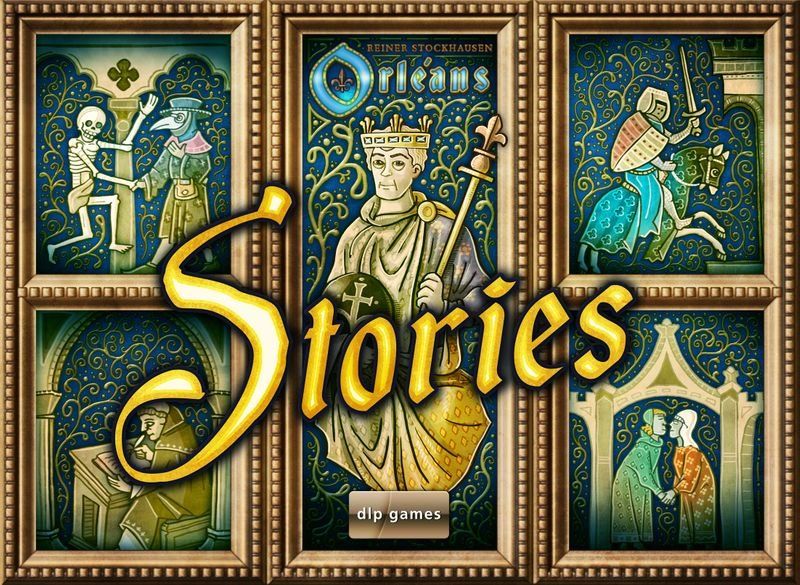
Ava: Hopefully the latest from Reiner Stockhausen won’t send you to Bore-leans, given that it’s a dramatic variant of ‘pulling folk out of a bag’ game Orleans.
Quinns: Ah, the prequel to ‘pulling alpacas out of a bag’ game Altiplano.
Ava: A vital part of the ‘pulling things out of bags’ cinematic universe.
Orleans Stories will include an introductory and epic story mode, that will shuffle up the base game and give you a set of shifting goal posts and restrictions. This will let you and your fellow French Nobles pluck people out of a little bag and send them out from the titular city and into the wild world of the Loire Valley.
I’m a bit nervous about the prospect of player elimination between the game’s eras, as sitting down to play a game and then being told you have to stop while your friends carry on is normally a bit of a blow, but I want to see how they’ll mix up the already quite satisfying game.
Ava: Oh my. Matt Leacock has given a massive wordsplurge about his latest invention, Era: Medieval Age.
Era is (nearly) a reboot of Roll Through the Ages, but also the start of a new series. Replacing the roll’n’write writing with physical buildings, the bronze age with castle-time, and the dice with more dice, Era will have you racing to build walls, homes and workplaces for a whole gang of dice-shaped folk representing the different classes and social roles of medieval society.
Watching the game make the leap from pen and paper to lovely lumps of plastic is a really good narrative for this sort of design diary, and I’m definitely curious for a game that takes the building frustration of rapidly closing options with something that you can show off to everyone at the table. This could be a really lovely little knot of tactility and table presence, and I’m looking forward to seeing how the series develops.

Ava: Leacock’s other series, Pandemic, is going through some very particular rebranding. I didn’t even know that the recent Pandemic special editions Iberia, Rising Tide and Fall of Rome, were called the ‘Survival Series’, which I’m reliably informed is not a wrestling match. The Survival Series is based on the European localities that hosted the Pandemic Survival World Championships made with local designers. Fascinating, yet poorly marketed.
You can forget all of that immediately, as Z-Man Games has decided that if people didn’t know about it, there wasn’t much benefit to it. They’re rebranding the whole line of games that actually use the core pandemic mechanics (which adds the Reign of Cthulhu game to the list, which I understand was not designed in collaboration with any elder gods) as the Pandemic System. This differentiates them from games that just happen in the ‘Pandemic Universe’, which I’ve already goggled at when talking about Pandemic: Rapid Response. Still the fictional universe I least want to live in.
This is all very inside baseball, and technically very tedious. ‘Some games to have a slightly different label on them’ doesn’t really warrant news, except that this is one of the biggest names out there, and Z-Man Games’ continually desperate Pandemic-pushing baffles me into a mild state of excitement.
Quinns: Z-Man’s parent company Asmodee is clearly pouring time and money into the most successful games it owns (Pandemic, Ticket to Ride and Catan, to name a few), but I’m not sure who all of these spin-off games are for?
I feel I’m watching someone nurture a tree that is the ‘Pandemic Expanded Universe’, unaware that it’s only going to produce diseased fruit. As this site has said before, there are some fantastic ideas in all of these new Pandemic games, but it feels like the Pandemic affiliation is holding them back, as opposed to helping them to stand out.
Ava: Agreed. Even though the only spinoff I have tried, dice game Pandemic: The Cure, was actually quite fun.
Ava: Curiouser and Curiouser. Alice in Wordland is a Lewis Carroll-copying party game set at the infamous Mad Hatter’s tea party. Players have to try to find a word to fit the round’s category without using the three letters barred by the famously capricious Red Queen.
Special character abilities will be swapped at the end of each round, until everyone’s had a chance to be everyone, which delights me if only because I get to yell ‘change places’ in my most overdramatic voice, and that’s basically what I play games for.
Quinns: Wait, so I can’t use the letters-
Ava: CHANGE PLACES!
Quinns: F***!
Ava: None of those letters were allowed, Quinns.
Quinns: Sorry. It’s cool that designers can use Alice in Wonderland and Sherlock Holmes as settings for their board games because the books are out of copyright, but I’m always wondering at what other old novels they might use. Push-your-luck based on Journey to the Centre of the Earth? Some kind of Oliver Twist hidden movement game about picking pockets in London town (pronounced “Lahndahn tahn”)?
Ava: I still can’t wait for Mage Knight to be rebranded as the epic of Gilgamesh, a social deduction take on Chesterton’s ‘The man who was Thursday’ or a study in analysis paralysis heavy resource management game based on Hamlet.
Quinns: Holy crap, is Shakespeare out of copyright?
Ava: Guy’s been dead for centuries, Quinns.
Quinns: WHAT?
Ava: We’ve got an odd little double header from family game giant Hasbro, who this week have done something awful, and something lovely!
In the lovely corner, we have an announcement that Hasbro will be phasing out all plastic packaging from it’s board games by 2022. They’re chucking out the shrink-wrap, the cellophane, the blister packs, the elastic bands, and even the humble plastic baggie.
Quinns: Unfortunately, Hasbro is also in the news for producing (and almost immediately stopping production of) a parody edition of Monopoly titled Monopoly Socialism. Essentially, the game is a vehicle for all of the least informed American stereotypes of a welfare state, a lot of which stem from decades of anti-communist rhetoric. The game sees players receiving a $50 living wage when they complete a lap of the board, as opposed to the standard $200 (never mind that that mechanic is the definition of handout), and features chance cards with titles like “lousy neighbours, vegan meatloaf and bad plumbing”.
Taken as a whole, it’s somehow both insidious and nonsensical, and that’s before you consider that it’s been created by a family friendly board game manufacturer. “Winning is for capitalists!” declares the box, as if the entire point of the standard version of Monopoly wasn’t that most people lose. If Monopoly Socialism really wanted to be a parody, it would be a version of Monopoly which went on forever because it siphoned money from the richest player to the poorest player. Instead, we get a version of the game that mocks environmentalism.
Ava: Biggest ever sigh.
Considering Monopoly’s political roots, I think it’d be great if someone converted Monopoly into a useful criticism of other political structures, but everything I’ve seen about this seems tossed together, cheap and nasty. As a pretty obviously left-leaning person, I’m genuinely sad they didn’t aim their sights a little higher so they could have at least given me something worth arguing with.
Ava: In further reading this week, we’ve got the oddity of an AI that’s trying to figure out how to play ancient board games. It’s not trying to get good at them though, it’s trying to work out how boards, pieces and local culture is likely to have fallen together to create playable sets of rules. It’s breaking up the possible elements of a game into ‘ludemes’, a word I can’t wait to squeeze into my next pretentious games conversation, and then combining them in multiple ways to try and find something playable, interesting and relevant to the original context. As with much of ancient history, we may never know what was actually happening with all these bits and pieces, but it’s really exciting to see what might have been.
Ava: Also worth your reading time, we’ve got Magic: The Gathering’s head designer Mark Rosewater talking about why diversity is good for game design. I always feel a little funny about things that focus on practical benefits of something that you should obviously be doing anyway, but I think it’s useful when the people currently holding power in the industry acknowledge that they have work to do, and remind people that it’s worth doing. As part of the call for diversity, there’s some really strong insights into what makes a successful game, and the need for at least some people to find details they love. It’s all about the love.

